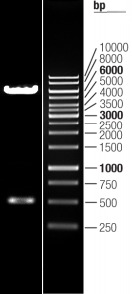 首页>
生物试剂
首页>
生物试剂
商家描述
产品评价(0)
商品介绍
gene_symbol:EPOR
Synonyms:EPO-R
clone_name:OTI4F12
immunogen:Human recombinant protein fragment corresponding to amino acids 25-250 of human EPOR (NP_000112) produced in E.coli.
predicted_size:
background:This gene encodes the erythropoietin receptor which is a member of the cytokine receptor family. Upon erythropoietin binding, this receptor activates Jak2 tyrosine kinase which activates different intracellular pathways including: Ras/MAP kinase, phosphatidylinositol 3-kinase and STAT transcription factors. The stimulated erythropoietin receptor appears to have a role in erythroid cell survival. Defects in the erythropoietin receptor may produce erythroleukemia and familial erythrocytosis. Dysregulation of this gene may affect the growth of certain tumors. Alternate splicing results in multiple transcript variants. [provided by RefSeq, May 2010]
buffer:PBS (pH 7.3) containing 1% BSA, 50% glycerol and 0.02% sodium azide.
purification:Purified from mouse ascites fluids or tissue culture supernatant by affinity chromatography (protein A/G)
isotype:IgG2a
host:Mouse
applications:IHC, WB
Recommend Dilution:WB 1:2000, IHC 1:150
reactivities:Human
storage:Store at -20°C as received.
gene_symbol:EPOR
Synonyms:EPO-R
clone_name:OTI4F12
immunogen:Human recombinant protein fragment corresponding to amino acids 25-250 of human EPOR (NP_000112) produced in E.coli.
predicted_size:
background:This gene encodes the erythropoietin receptor which is a member of the cytokine receptor family. Upon erythropoietin binding, this receptor activates Jak2 tyrosine kinase which activates different intracellular pathways including: Ras/MAP kinase, phosphatidylinositol 3-kinase and STAT transcription factors. The stimulated erythropoietin receptor appears to have a role in erythroid cell survival. Defects in the erythropoietin receptor may produce erythroleukemia and familial erythrocytosis. Dysregulation of this gene may affect the growth of certain tumors. Alternate splicing results in multiple transcript variants. [provided by RefSeq, May 2010]
buffer:PBS (pH 7.3) containing 1% BSA, 50% glycerol and 0.02% sodium azide.
purification:Purified from mouse ascites fluids or tissue culture supernatant by affinity chromatography (protein A/G)
isotype:IgG2a
host:Mouse
applications:IHC, WB
Recommend Dilution:WB 1:2000, IHC 1:150
reactivities:Human
storage:Store at -20°C as received.
 会员登录
会员登录.getTime()%>)
 购物车()
购物车()

 成功收藏产品
成功收藏产品